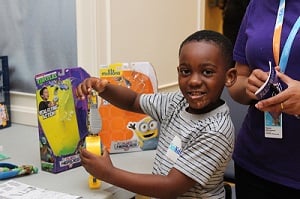News & Stories
Read the latest news and stories in the SickKids newsroom. Looking to interview someone? Connect with our media team.

September 17, 2015
The Peter Gilgan Centre for Research and Learning (Gilgan Centre) at SickKids is celebrating its two-year anniversary and we’re excited to share all the amazing progress we’ve made!

September 16, 2015
Terry Fox Foundation grants $2.2 million to SickKids cancer research
Researchers at The Hospital for Sick Children (SickKids) will receive $2.2 million from the Terry Fox Foundation over the next three years to continue their research on a rare cancer predisposition condition called Li-Fraumeni Syndrome.

September 4, 2015
Sun safety tips from Dr. Miriam Weinstein
Dr. Miriam Weinstein, Dermatologist at SickKids, shares tips on how to have fun in the sun safely!

September 1, 2015
New genetic tests playing a role in the management of autism spectrum disorder
A new study has looked at the diagnostic yield of two newer genetic testing methods among children with autism spectrum disorder (ASD). In some cases, the ASD-associated genetic changes result in targeted medical treatment of the child at an earlier age.

August 31, 2015
Turning stem cells into bile duct cells to study ‘disease in a dish’
A Toronto team of clinician-scientists and stem cell biologists has developed a powerful new method to generate 3D bile duct structures from human stem cells in order to study and develop new treatments for bile duct diseases.

August 25, 2015
A team of researchers led by The Hospital for Sick Children (SickKids) and Lawson Health Research Institute found that survival was the highest, especially among teens, with 10 to 35 minutes on the scene in the care and under the treatment of Paramedics.

August 24, 2015
New guidelines aim to reduce vaccination pain in children and adults
A new Canadian guideline, published online in CMAJ (Canadian Medical Association Journal) on Aug. 24, aims to help minimize pain and distress from vaccinations in both children and adults. It outlines a variety of proven interventions that can reduce the pain that has historically been considered a necessary part of immunization.

August 24, 2015
Government of Ontario invests in facility upgrades and repairs at SickKids
Han Dong, MPP, Trinity-Spadina, visited SickKids on Aug. 21 to specifically discuss the funding designated to SickKids, the University Health Network (UHN) and the Centre for Addiction and Mental Health (CAMH), hospitals located within MPP Dong’s riding.

August 21, 2015
Young toy experts test drive new toys at SickKids
SickKids patients and families used their expertise in play to test drive the season’s newest toys at the fourth annual Parents Canada toy testing event on Aug. 19.

August 20, 2015
Toronto researchers shed new light on stroller use in young families
In the first study of its kind, a Toronto research team has gone right to the source – parents – to understand their habits and perceptions of stroller use and its relationship with children’s physical activity.

August 13, 2015
In a new study published in Environmental Health, researchers from The Hospital for Sick Children (SickKids) and Norwich University report an urgent need to re-evaluate the World Health Organization’s drinking-water guidelines for nine toxic chemicals commonly found in drinking water.

August 13, 2015
Increased physical activity may improve health outcomes for children with multiple sclerosis
Research from The Hospital for Sick Children (SickKids) suggests that children with multiple sclerosis (MS) who participate in higher levels of physical activity may have a less active disease.

